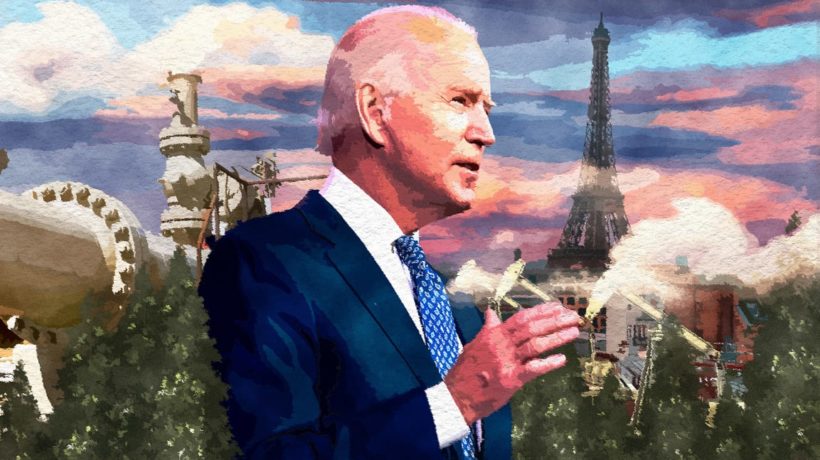The last four years have been devastating for environmental regulation. The Trump administration dismantled the Clean Power Plan, opened Arctic wilderness for drilling, and, as part of a spree of rollbacks in his last days in office, shrank the protected habitat of the northern spotted owl. Those are just the most visible of the more than 100 rollbacks of environmental rules spearheaded by the administration. Now the Biden administration will start trying to reinstate them. Some of the changes will take years to reverse—and going further will often require votes in the Senate that may not be winnable. But Biden can also begin to repair some of the damage on his first day in office.
The list of work is long; one tracker from Berkeley Law’s Center for Law, Energy & the Environment includes more than 50 rollbacks that the new administration could address right away. Here are a few of the things that could happen in Biden’s first days in office.
Rejoin the Paris Agreement
After Trump announced his intent to withdraw the U.S. from the Paris climate agreement, the crucial global deal that aims to limit emissions to avoid the worst impacts of climate change, he had to wait three years to formally get out. Biden plans to rejoin on his first day. After sending a letter to the UN, the U.S. can be back in the agreement in 30 days. Then the U.S. will need to set new goals for cutting emissions. “It needs to be updated for a new timeline and new climate needs and a new reality,” says Ted Lamm, a senior research fellow on climate at the Center for Law, Energy & the Environment. “So it’s a long-term process to develop the actual implementation of that, but they can rejoin on day one, and that’s, I think, pretty significant.”
Ban new fossil fuel leases and permits
Trump worked to make it easier for oil and gas companies to drill on federal land. The time to get a permit to drill, for example, dropped by more than half. The administration also got rid of so-called master leasing plans, an Obama policy designed to manage drilling in sensitive areas such as national parks. On the campaign trail, Biden said that he would put new fossil leases and permits on federal land on hold on his first day in office, moving forward with new development only if it’s consistent with climate goals. The administration can also begin the review of any prior leases and permits to cancel any that were improperly issued.
Cancel the Keystone XL pipeline permit
In 2015, the Obama administration denied a permit for the construction of the Keystone XL pipeline—designed to carry 830,000 barrels of crude oil each day from tar sands in Canada to the U.S.—citing the fact that the project would undercut U.S. leadership on climate change. Trump approved the permit in 2017, though a court later blocked the permit, saying that another environmental review was needed. Now, Biden is expected to cancel the permit on his first day in office.
Restore national monuments
In 2017, the Trump administration issued a proclamation shrinking two national monuments—Bears Ears and Grand Staircase-Escalante in Utah—by 85% and 50% respectively, opening the rest for mining and oil and gas drilling. Lawsuits are still pending from Native American tribes that consider the land sacred. Biden can issue a new proclamation restoring the original boundaries of the monuments.
Support global climate action
The U.S. had pledged $3 billion to the Green Climate Fund, a United Nations program that helps low-income countries cut carbon emissions. Trump stopped the payments; Biden can reinstate them and potentially pledge additional funding.
Prevent pollution hotspots
As Biden addresses Trump’s rollbacks, he can also begin to put new programs in place. In a list of 25 actions that Biden could take immediately to address climate change, a coalition of groups called Build Back Fossil Free is advocating for a federal “no hotspots” policy that would take on the problem of disproportionate pollution in communities of color. The government can start mapping the communities that are hardest hit and could stop new fossil fuel development, operations, and transport in those communities.
Put climate change back on federal websites
The Trump administration removed several important web pages focused on climate change, such as a page that included details about the Clean Power Plan. One analysis in 2019 found that a quarter of words related to global warming, such as “climate change,” “clean energy,” and “adaptation,” had been scrubbed from government websites. The new administration can quickly update those websites with accurate scientific information.
As the new administration deals with multiple crises—from record COVID-19 cases to growing job losses—it’s not clear how quickly it will handle the full list of Trump’s rollbacks. Putting a replacement for the Clean Power Plan in place, for example, could take a year or two to go through a full rulemaking process. “Essentially, what the Trump administration has done is taken away a huge amount of time from the Biden administration,” says Lamm. “Instead of being able to make more proactive progress on all of these fronts on day one, they have to go through and identify backtracking and what they have to do to get back to baseline. It will happen. It’s just going to take a lot of time.”







